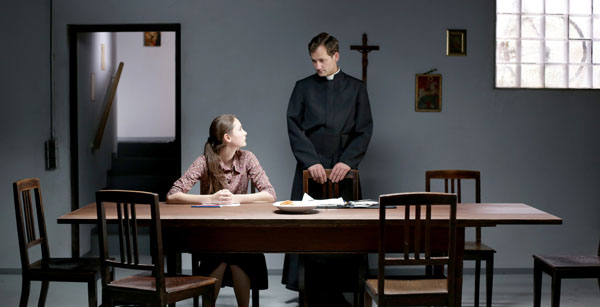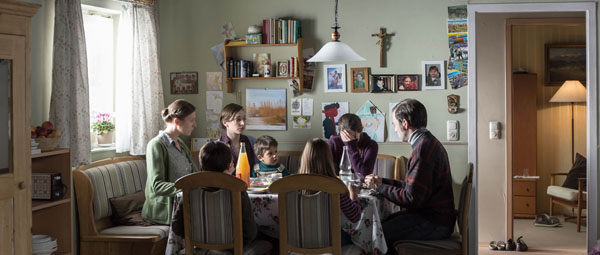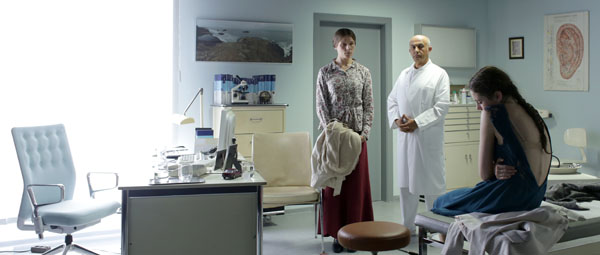Sunday at the Berlinale, where you can walk the Stations of the Cross (Kreuzweg) with Maria (Lea van Acken) and then track the Way of Sorrows all over again with Father James (Brendan Gleeson) in Calvary. Dietrich Brüggemann’s Competition entry, one of four from Germany at the Berlinale this year, is a spare but searingly comic indictment of religious fervor and intolerance, while John Michael McDonagh’s followup to The Guard is as choppy as the waves pounding the northern coast of Ireland. Word that Pope Francis was ushering in a kinder, gentler era for the Catholic Church most likely came too late for these productions, but it’s doubtful that either Brüggemann and his writing partner and sister, Anna, or McDonagh would tweak a word of their screenplays even today.
There have always been fourteen Stations, though the events at each of them were revised in 1991 to adhere closer to scripture. The Brüggemanns have chosen to stick with the centuries-old traditional form, beginning with “Jesus is condemned to death.” Lights up on a table in a bare room. At the center, Father Weber (Florian Stetter, seen just yesterday as Schiller in Dominik Graf’s splendid Beloved Sisters), and symmetrically placed around him so as to visually echo various renditions of the Last Supper are six kids preparing for their First Holy Communion. Father Weber gently but firmly exhorts them to rededicate themselves as soldiers for Christ, reminding them that Satan is alive and well out there and that he’s even had a foot in the door to the Church itself ever since the disastrous Second Vatican Council—disastrous, that is, in the eyes of the offshoot of the Church to which they belong, the Society of St. Paul (it doesn’t exist, but its inspiration, the Society of St. Pius X, most definitely does).
During Father Weber’s pep talk, simultaneously absurd, funny, alarming and tragic, it dawns on the viewer that the camera is not going to move. One suspects that the entire film will be composed of fourteen single static shots, and one would be almost correct; the camera moves, steadily and slowly, during three of them. Once the talk wraps and the kids scamper off, Maria stays after to ask Father Weber, Wouldn’t the greatest sacrifice of all be to give one’s life to God, especially if you had a sick younger brother at home you were praying for? Maria’s fate is instantly sealed, its trajectory already mapped. Thirteen more stations to go. But you know what they say. It’s the journey.
On Critic.de‘s grid of grades, you’ll find, as of this writing, two fairly positive ratings, a mixed verdict, and two absolute condemnations of Stations. I spoke this afternoon with a third critic who utterly despises this film, going so far as to call it “offensive.” By this point, you may have surmised that I respectfully disagree. For some, Brüggemann may be taking potshots at an easy target, but Maria’s struggles with minor infractions that, in her fourteen-year-old eyes, are damnable sins, are hauntingly resonant with my own past experiences. That aside, while the staging may be a tad theatrical, it does showcase a few marvelous performances, particularly those of Franziska Weisz as Maria’s ludicrously monstrous mother and Ramin Yazdani as a doctor who suspects that Maria’s afflictions are not merely physical.
WHAT OTHERS ARE SAYING
For Variety‘s Jay Weissberg, it’s “unclear whether a tilt into absurdity is meant to be funny or whether the scripters are in dead earnestness. With Ulrich Seidl it’s easy to tell, but here there’s more than a sneaking suspicion that the rush to preach against religious excess—a worthy pursuit—has merely resulted in another form of sanctimonious sermonizing.”
“Though leavened with occasional moments of acerbic humor,” writes Boyd van Hoeij in the Hollywood Reporter, Stations “is an impressive but also rather grim cinematic experience… Newcomer Van Acken is a phenomenal find and she’s never less than believably torn between doing the right thing and being her own person.”
“The contrast between Florian Stetter’s handsome, friendly face and his practically diabolical way of manipulating innocent children makes him even more fearsome and dangerous,” adds Dan Fainaru in Screen Daily.
Updates, 2/23: Noting that many drew comparisons to Haneke during the festvial, the Voice‘s Stephanie Zacharek declares, “I think it’s better than that: While stark, it’s far from chilly—Brüggemann has a sense of humor about his subject matter. And unlike Haneke, he has clear sympathy for his characters. He doesn’t just hold them up like petrified specimens gripped in a pair of tweezers, examples of the eternal coldness of the human heart, or whatever it is Haneke is so hung up on.”
For Giovanni Marchini Camia, dispatching to Film Comment, a “major problem is the excessive caricature of the two central characters, Maria and her odious, scripture-bashing harpy of a mother. The latter is so overdrawn and schematic, she is impossible to take seriously. As a result, it is equally hard to believe in the psychological damage she has inflicted on her daughter, who in any case is such a passive victim that her complete inability to exercise any independent thought whatsoever eventually erodes all sympathy towards her martyrdom.”
“Everything about the film feels as if it’s going to take on the preachy, didactic tone of the subjects it seeks to admonish, though director Brüggemann’s biggest coup here is to deliver the film in a primarily comic register,” finds David Jenkins at Little White Lies.
Reviewing the winner of the Silver Bear for best screenplay at the Playlist, Jessica Kiang‘s felt “a dull rage at its deterioration from an intriguing, well-crafted premise to a manipulative, sanctimonious, woolly-minded muddle.” More from Geoff Andrew (BFI) and Tom Christie (Thompson on Hollywood).
Performances are the greatest strength of Calvary, whose setup is established in its first minutes. “I first tasted semen when I was seven years old” is the very first line, and it comes from a man we do not see on the other side of the grid in a confessional, wherein our eyes remain fixed on Brendan Gleeson’s Father James. His reaction, reworked in the trailer as a reply to the parishioner’s eventual declaration of his plan to settle the score after years of being abused as a child by priests—namely, to kill him, a good priest, a far more appropriate sacrificial lamb than a bad priest—captures the essence of Gleeson’s portrayal of a man who’s come to the priesthood after years of playing the role of the proverbial prodigal son. He is concerned; he grasps the magnitude of man’s suffering; he knows the threat is not idle; he has not lost his sense of humor.
Given one week to settle his affairs, Father James sets out to settle those of seemingly everyone living in the small Irish coastal town, but of course, he’s only human. Plot points are out in the open, naked, and Father James even says as much out loud as we swerve into the third act. Calvary premiered at Sundance, and the reviews are out, so I’m going to turn to…
WHAT OTHERS ARE SAYING
… and begin with Guy Lodge at In Contention, since he lists the real reasons to go ahead and see Calvary if it comes around: the actors. Calvary falls into “the grand tradition of small community-based narratives where all is not as it seems,” writes Guy. “One by one, the villagers are given a chance to tell their variously unhappy stories: the local butcher (Chris O’Dowd) is being cuckolded by his openly promiscuous wife (Orla O’Rourke), who’s having it off with an Ivory Coast immigrant (Isaach de Bankolé), while a young, woman-shy nebbish (Killian Scott) plots an escape to the army. A police inspector (Gary Lydon) enacts suppressed desires with a young rentboy, an American writer (M. Emmett Walsh) in declining health plots his suicide, a hardline-atheist doctor (Aidan Gillen) watches life come and go with bitter detachment, and so on and so forth. The contrivances are as thick as the Irish brogues, but naturalism is far from the objective here.”
“It’s puckish and playful, mercurial and clever, rattling with gallows laughter,” writes the Guardian‘s Xan Brooks. More from Todd Brown (Twitch), Justin Chang (Variety), Michael Cusumano (Film Experience), Katherine Kilkenny (Indiewire, B+), Rodrigo Perez (Playlist, A-), David Rooney (Hollywood Reporter) and Eric D. Snider (Film.com, 6.5/10). Interviews: HitFix (10’18”), THR (2’44”) and Vanity Fair (5’59”).
“Fox Searchlight has acquired U.S. rights and select international rights,” reports Andrew Stewart for Variety.
About-face. In That Demon Within, Dante Lam blends a dash of the supernatural and way, way too much pop psychology into what would otherwise make for a ripping cops vs. robbers thriller. The action set pieces towards the end, sending cars, glass, flames and bodies on over-the-top, criss-crossing arcs are dazzling; the early ones rely a bit too heavily on the shaky cam. Some of the best ideas—a policeman in pursuit is thrown off by a bit of news and he perceives himself and his car to be pulling off an impossible 360-degree rotation while the world outside his window remains steady as a builder’s level—are grounded in this protagonist’s schizophrenia, so poorly handled and overly explained that you can’t help but wish that there were a different justification for the hallucination—sheer exhaustion, for example, would be more than plausible.
At any rate, I had a good time, though it would have been even better without the umpteen minutes spent on the friend-of-a-friend psychologist’s off-hours diagnosis.
WHAT OTHERS ARE SAYING
“A psychodrama set amid funeral parlors, graveyards and creepy old tenement buildings, That Demon Within owes as much to Hong Kong’s vintage horror genre as it does to the strong noir style of Dante Lam’s superior cop thrillers The Beast Stalker and The Stool Pigeon,” writes Maggie Lee in Variety. “Working from a real-life criminal case but steeping it in ghoulish Chinese supernatural lore, the action auteur turns a policeman’s battle with a Jekyll-and-Hyde personality into an exploration of the evil instinct latent in everyone. The result is Lam’s darkest work to date, one where violence is not just graphic but ugly, and Hong Kong symbolically comes to resemble a charnel house.”
“Despite a slightly opaque and somewhat overblown narrative, That Demon Within is a professionally executed production, laden with impressive special effects shots and bone-crunching violence,” finds Fionnuala Halligan in Screen Daily.
Update, 2/23: “American-born HK star Daniel Wu (The Last Supper) [delivers] an eerie but highly effective performance,” finds Deborah Young in the Hollywood Reporter. “Though the cops and robbers are so low-tech they seem retro (there’s nary an electronic device in the story), Lam’s filmmaking team deliver thrills on schedule with solid effects, crisp shooting and fast cutting.”
For news and tips throughout the day every day, follow @KeyframeDaily on Twitter and/or the RSS feed. Get Keyframe Daily in your inbox by signing in at fandor.com/daily.






